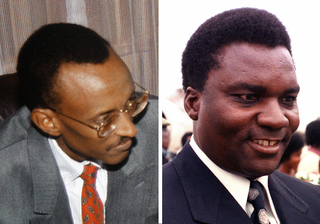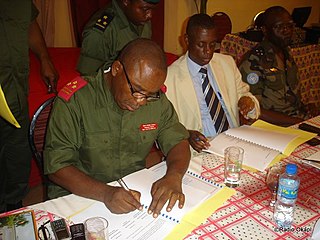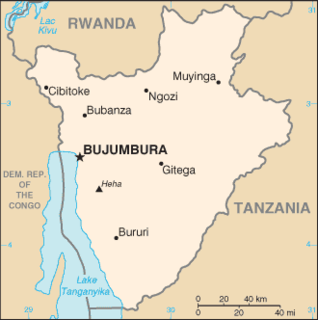Related Research Articles

Rwanda, officially the Republic of Rwanda, is a landlocked country in the Great Rift Valley, where the African Great Lakes region and East Africa converge. One of the smallest countries on the African mainland, its capital city is Kigali. Located a few degrees south of the Equator, Rwanda is bordered by Uganda, Tanzania, Burundi, and the Democratic Republic of the Congo. It is highly elevated, giving it the soubriquet "land of thousand hills", with its geography dominated by mountains in the west and savanna to the east, with numerous lakes throughout the country. The climate is temperate to subtropical, with two rainy seasons and two dry seasons each year. Rwanda has a population of over 12.6 million living on 26,338 km2 of land, and is the most densely populated mainland African country.

Burundi is one of the few countries in Africa to be a direct territorial continuation of a pre-colonial era African state.
Human occupation of Rwanda is thought to have begun shortly after the last ice age. By the 16th century, the inhabitants had organized into a number of kingdoms. In the 19th century, Mwami (king) Rwabugiri of the Kingdom of Rwanda conducted a decades-long process of military conquest and administrative consolidation that resulted in the kingdom coming to control most of what is now Rwanda. The colonial powers, Germany and Belgium, allied with the Rwandan court.

The International Criminal Tribunal for Rwanda was an international court established in November 1994 by the United Nations Security Council in Resolution 955 in order to judge people responsible for the Rwandan genocide and other serious violations of international law in Rwanda, or by Rwandan citizens in nearby states, between 1 January and 31 December 1994. The court eventually convicted 85 individuals at a cost of $1.3 billion.

Michel Micombero was a Burundian politician and army officer who ruled the country as its first president and de facto dictator for the decade between 1966 and 1976.

The Rwandan genocide was a genocide against the Tutsi in Rwanda, carried out between 7 April and 15 July 1994 during the Rwandan Civil War. The most widely accepted scholarly estimates are around 500,000 to 600,000 Tutsi deaths.

Jean-Baptiste Bagaza was a Burundian army officer and politician who ruled Burundi as president and de facto military dictator from November 1976 to September 1987.

The Burundian Civil War was a civil war in Burundi lasting from 1993 to 2005. The civil war was the result of long standing ethnic divisions between the Hutu and the Tutsi ethnic groups in Burundi. The conflict began following the first multi-party elections in the country since independence from Belgium in 1962, and is seen as formally ending with the swearing in of Pierre Nkurunziza in August 2005. Children were widely used by both sides in the war. The estimated death toll stands at 300,000.

The Rwandan Civil War was a large-scale civil war in Rwanda which was fought between the Rwandan Armed Forces, representing the country's government, and the rebel Rwandan Patriotic Front (RPF) from 1 October 1990 to 18 July 1994. The war arose from the long-running dispute between the Hutu and Tutsi groups within the Rwandan population. A 1959–1962 revolution had replaced the Tutsi monarchy with a Hutu-led republic, forcing more than 336,000 Tutsi to seek refuge in neighbouring countries. A group of these refugees in Uganda founded the RPF which, under the leadership of Fred Rwigyema and Paul Kagame, became a battle-ready army by the late 1980s.

Hutu Power is a racist and ethnosupremacist ideology propounded by Hutu extremists in Rwanda. It led to the 1994 Rwandan genocide against the Tutsi. Hutu Power political parties and movements included the Akazu, the Coalition for the Defence of the Republic and its Impuzamugambi paramilitary militia, and the governing National Republican Movement for Democracy and Development and its Interahamwe paramilitary militia.

The 2009 Eastern Congo offensive was a joint Congo-Rwanda military offensive against the Hutu FDLR rebel group descended from those groups that carried out the 1994 Rwanda genocide. Two operations were carried out, 'Kimia II' and 'Umoja Wetu.' 'Kimia' can be translated as 'calm.' "Umoja Wetu" is Swahili for "Our Unity".

Burundi, officially the Republic of Burundi, is a landlocked country in the Great Rift Valley where the African Great Lakes region and East Africa converge. It is bordered by Rwanda to the north, Tanzania to the east and southeast, and the Democratic Republic of the Congo to the west; Lake Tanganyika lies along its southwestern border. The capital cities are Gitega and Bujumbura.

Ethnic groups in Burundi include the three main indigenous groups of Hutu, Tutsi and Twa that have largely been emphasized in the study of the country's history due to their role in shaping it through conflict and consolidation. Burundi's ethnic make-up is similar to that of neighboring Rwanda. Additionally, recent immigration has also contributed to Burundi's ethnic diversity. Throughout the country's history, the relation between the ethnic groups has varied, largely depending on internal political, economic and social factors and also external factors such as colonialism. The pre-colonial era, despite having divisions between the three groups, saw greater ethnic cohesion and fluidity dependent on socioeconomic factors. During the colonial period under German and then Belgian rule, ethnic groups in Burundi experienced greater stratifications and solidification through biological arguments separating the groups and indirect colonial rule that increased group tensions. The post-independence Burundi has experienced recurring inter-ethnic violence especially in the political arena that has, in turn, spilled over to society at large leading to many casualties throughout the decades. The Arusha Agreement served to end the decades-long ethnic tensions, and the Burundian government has stated commitment to creating ethnic cohesion in the country since, yet recent waves of violence and controversies under the Pierre Nkurunziza leadership have worried some experts of potential resurfacing of ethnic violence. Given the changing nature of ethnicity and ethnic relations in the country, many scholars have approached the topic theoretically to come up with primordial, constructivist and mixed arguments or explanations on ethnicity in Burundi.

The 1996 Burundian coup d'état was a military coup d'état that took place in Burundi on 25 July 1996. In the midst of the Burundi Civil War, former president Pierre Buyoya deposed Hutu President Sylvestre Ntibantunganya. According to Amnesty International, in the weeks following the coup, more than 6,000 people were killed in the country. This was Buyoya's second successful coup, having overthrown Jean-Baptiste Bagaza in 1987.
The Rwandan Revolution, also known as the Social Revolution or Wind of Destruction, was a period of ethnic violence in Rwanda from 1959 to 1961 between the Hutu and the Tutsi, two of the three ethnic groups in Rwanda. The revolution saw the country transition from a Belgian colony with a Tutsi monarchy to an independent Hutu-dominated republic.
Violence during the Rwandan genocide of 1994 took a gender-specific form when, over the course of 100 days, up to half a million women and children were raped, sexually mutilated, or murdered. The International Criminal Tribunal for Rwanda (ICTR) handed down the first conviction for the use of rape as a weapon of war during the civil conflict, and, because the intent of the mass violence against Rwandan women and children was to destroy, in whole or in part, a particular ethnic group, it was the first time that mass rape during wartime was found to be an act of genocidal rape.

On 18–19 October 1965, a group of ethnic Hutu officers from the Burundian military attempted to overthrow Burundi's government in a coup d'état. The rebels were angry about the apparent favouring of ethnic Tutsi minority by Burundi's monarchy after a period of escalating ethnic tension following national independence from Belgium in 1962. Although the Prime Minister was shot and wounded, the coup failed and soon provoked a backlash against Hutu in which thousands of people, including the participants in the coup, were killed. The coup also facilitated a militant Tutsi backlash against the moderate Tutsi monarchy resulting in two further coups which culminated in the abolition of Burundi's historic monarchy in November 1966 and the rise of Michel Micombero as dictator.
The following lists events that happened during 2016 in the Democratic Republic of the Congo.

Massacres of Hutus during the First Congo War refers to the mass killing of Rwandan, Congolese, and Burundian Hutu men, women, and children in villages and refugee camps then hunted down while fleeing across the territory of Democratic Republic of Congo from October 1996 to May 1997.

The Ikiza or the Ubwicanyi (Killings) was a genocide which was committed in Burundi in 1972 by the Tutsi-dominated army and government against the Hutus who lived in the country. Conservative estimates place the death toll of the genocide between 100,000 and 150,000 killed, while some estimates of the genocide's death toll go as high as 300,000.
References
- 1 2 3 "DRC: 34 civilians killed in Hutu village". Africanews. November 27, 2016. Retrieved February 20, 2017.
| This North Kivu Province location article is a stub. You can help Wikipedia by expanding it. |